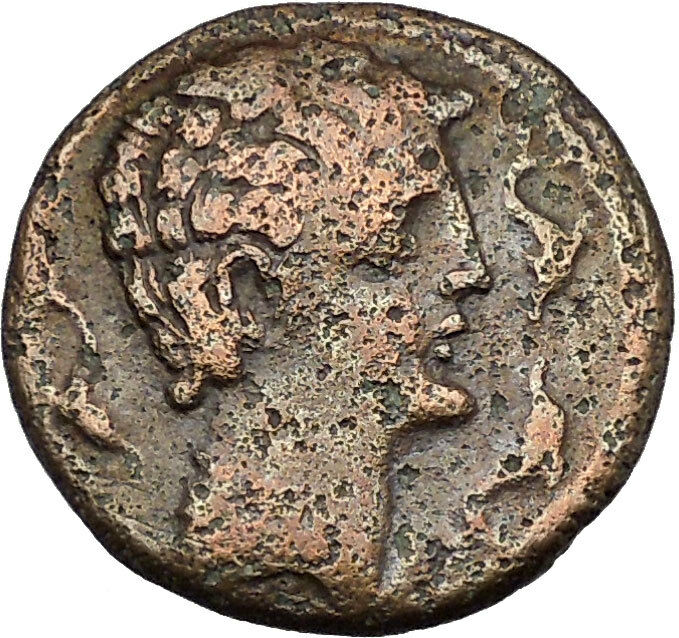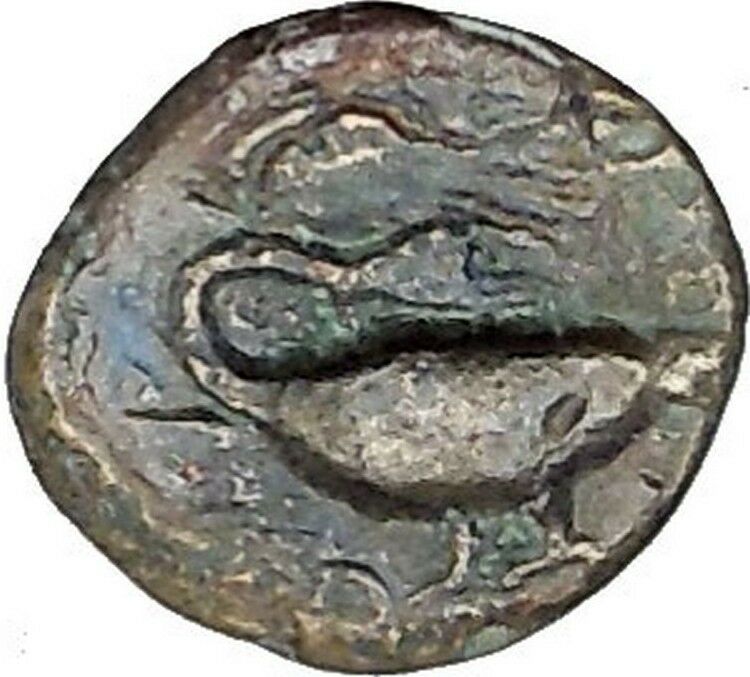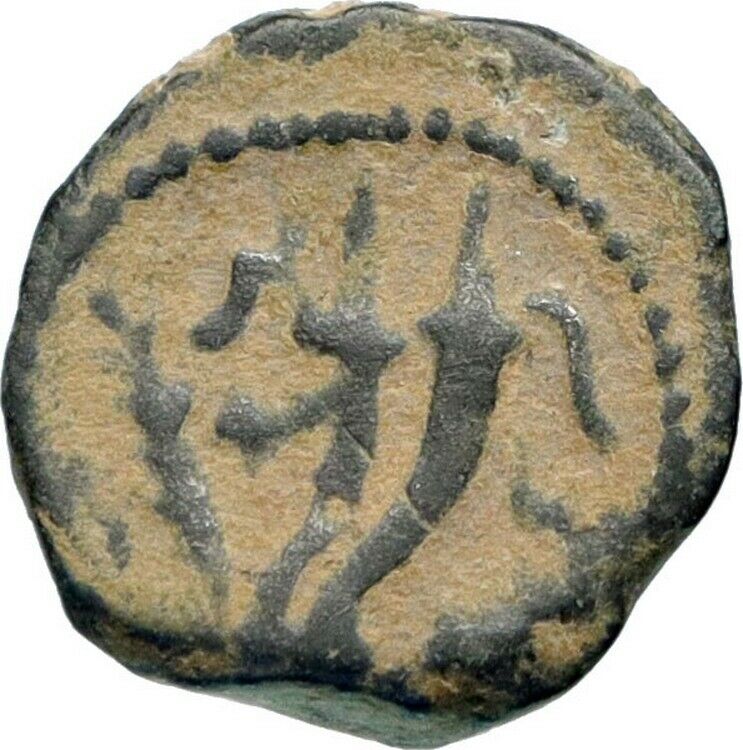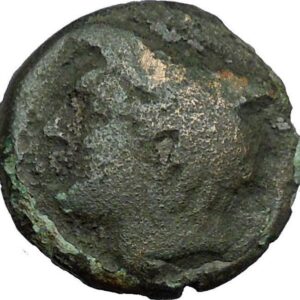|
Greek city of
Pelinna in
Thessaly
Bronze 15mm (2.51 grams) Struck circa 425-350 B.C.
Reference: HGC 4, 276; SNG Copenhagen (Thessaly), nos. 188-189; BCD Thessaly I,
lot 1231; BCD Thessaly II lot 531.1
Horseman
wearing petasos and chlamys, on horse
prancing left
ΠEΛΛINAEIΩN, Manto
standing right, holding open box.
You are bidding on the exact item pictured,
provided with a Certificate of Authenticity and Lifetime Guarantee of
Authenticity.
Manto was the daughter of the prophet
Tiresias
and mother of
Mopsus
. Tiresias was a
Theban
oracle who, according to tradition, was
changed into a woman after striking a pair of copulating snakes with a rod, and
was thereafter a priestess of
Hera.
During the War of the
Epigoni
, a later myth relates, Manto was
brought to Delphi
as a war prize.
Apollo
sent her to
Colophon
to find an
oracle
devoted to him. She married
Rhacius
and gave birth to
Mopsus
(although by some accounts
Apollo
was the father). According to the
Bibliotheca
, she had two children by
Alcmaeon
—
Amphilochus
and
Tisiphone
. In
Roman myth
, Manto went to
Italy
and gave birth to
Ocnus
(father:
Tiberinus
, the
genius
of the river
Tiber
). Ocnus founded
Mantua
and named it after his mother.
It was said that Manto’s abilities in prophecy were much greater than her
father’s.
She is one of the fortune-tellers and diviners whom Dante sees in the fourth
pit of the eighth circle of the
Inferno
.
Pelinna ((Latin:
Pelinnseum) was an
ancient Greek
city
with a celebrated
temple
of
Zeus Pelinnaeus, in Estiaeotis,
ancient Thessaly
. Pelinna was situated between
Tricca
and
Pharcadon
, near modern Palaiogardiki (Trikala
prefecture). The city gained particular prominence in the fourth
century BC through its alliance with
Philip II of Macedon
. Among other
archaeological evidence of the religious significance of Pelinna are two
Orphic
gold tablets (lamellae)
found in 1985 on the site of Petroporos, dating to the late 4th century BC
Ancient Thessaly or Thessalia (Greek:
Αρχαία Θεσσαλία,
Thessalian
:
Πετθαλία, Petthalia) was one of the traditional regions of
Ancient Greece
. During the
Mycenaean period
, Thessaly was known as Aeolia,
a name that continued to be used for one of the major tribes of Greece, the
Aeolians
, and their dialect of Greek, (Aeolic).
Geography
Aperantia
(Ἀπεραντία) was a small region of
Thessaly, south of
Dolopia
.
History
Thessaly was home to extensive
Neolithic
and
Chalcolithic
cultures around
6000 BC
–2500
BC (see
Cardium Pottery
,
Dimini
and
Sesklo
).
Mycenaean
settlements have also been
discovered.
In mythology, Thessaly was homeland of the heroes
Achilles
and
Jason
, as well of mythological creatures and
peoples,
Centaurs
,
Lapiths
,
Phlegyans
and
Myrmidons
. Ancient tribes in Thessaly mentioned
by Homer or other poets were:
Aeolians
,
Magnetes
,
Perrhaebi
and
Pelasgians
.
The Thessalians were a
Thesprotian
tribe (according to
Herodotus
, vii. 176; Veil. Pat. i. 3), and
originally came from the Thesprotian
Ephyra
. Under the guidance of leaders, who are
said[by
whom?] to have been descendants of
Heracles
, they invaded the western part of the
country afterwards called Thessaly, and drove out or reduced to the condition of
Penestae
, or bondsmen, the ancient Aeolian
inhabitants. Afterwards, the Thessalians spread over the other parts of the
country, taking possession of the most fertile districts and compelling the
Peraebi
,
Magnetes
,
Achaean Phthiotians
and other neighbouring
people to submit to their authority and to pay them tribute. Like Laconica, the
population of Thessaly therefore consisted of three distinct classes:
-
The
Penestae
, whose condition was nearly the
same as that of the
Helots
.
-
The subject people, who inhabited the districts not
occupied by the Thessalian invaders. They paid tribute, as stated above, but
were personally free, though they had no share in the government. They
corresponded to the
Perioeci
of Laconica, by which name they
are called by Xenophon.
-
The Thessalian conquerors, who alone had any share in the
public administration, and whose lands were cultivated by the Penestae.
For some time after the conquest, Thessaly seems to have been
governed by kings of the race of
Heracleidae
, who may however have been only the
heads of the great aristocratic families, invested with the supreme power for a
certain time. Under one of these princes, named
Aleuas
, the country was divided into four
districts – Phthiotis, Plistiaeotis, Thessaliotis and Pelasgiotis: This division
continued throughout Thessalian history, and it may therefore be concluded that
it was not merely a nominal one. Each district may have regulated its affairs by
some kind of provincial council, but we are almost entirely in the dark
concerning the internal government of each district.
When occasion required, a chief magistrate was elected under
the name of
Tagus
, whose commands were obeyed by all four
districts. He is sometimes called king (basileus,
Herod, v. 63), and sometimes
archon
(Dionys. v. 74.) He levied soldiers from
the states in each district, and seems to have fixed the amount of tribute to be
paid by the allies. (Xenoph. Hell. vi. 1. § 19.) When
Jason of Pherae
was tagus, he had an army of
more than 8,000 cavalry and not less than 20,000 hoplites (Xenoph../. c.), and
Jason himself says that when Thessaly is under a tagus, there is an army of
6,000 cavalry and 10,000 hoplites. The tribute Jason levied from the subject
towns was the same as had been previously paid by one of the
Scopadae
family, whom Buttmann supposes to be
the same Scopas as the one mentioned by
Aelian
( V. H. xii. 1) as a contemporary of
Cyrus the younger
. When Thessaly was not united
under the government of a tagus, the subject towns possessed more independence.
(Xenoph. Hell. vi. 1. § 9.) In later times, some states called their ordinary
magistrates tagoi (Bockh, Corp. Liscr. n. 1770), which may have been done
however, as Hermann suggests, only out of affectation.
However, Thessaly was hardly ever united under one
government. The different cities administered their own affairs independently of
one another, though the smaller towns seem to have frequently “been under the
influence of the more important ones (Xenoph. Hell. vi. 1. § 8). In almost all
the cities, the form of government was
aristocratical
(dynastic rule rather than
isonomy
, according to Thucyd. iv. 78), and
it was chiefly in the hands of a few great families, who were descended from the
ancient kings. Thus Larissa was subject to the Aleuadae, whence Herodotus (vii.
6) calls them kings of Thessaly ; Cranon or Crannon to the Scopadae, and
Pharsalus to the
Creondae
. (Compare Theocr. xvi. -34, &c.) These
nobles had vast estates cultivated by the Penestae; they were celebrated for
their hospitality and lived in a princely manner (hospitable, magnificent,
the thessalian way Xenoph. Hell. vi. 1. § 3), and they attracted to their
courts many of the poets and artists of southern Greece. However, the Thessalian
commonality did not submit quietly to the exclusive rule of the nobles. Contests
between the two classes seem to have arisen early, and the conjecture of
Thirlwall
(vol. i. p. 438), that the election
of a tagus, like that of a
Roman dictator
, was sometimes used as an
expedient for keeping the commonalty under, appears very probable. At Larissa,
the Aleuadae made some concessions to the popular party. Aristotle (Pol. v. 5)
speaks, though we do not know at what time he refers to, of certain magistrates
at Larissa, who bore the name of
Politophylakes
and exercised a
superintendence over the admission of freemen, and were elected themselves out
of the body of the people whence they were led to court the people in a way
unfavourable to the interests of the aristocracy. There were also other
magistrates at Larissa of a democratic kind, called Larissopoioi. (Aristot.
Pol. iii. 1.) Besides the contests between the oligarchical and democratical
parties, there were feuds among the oligarchs themselves; and such was the state
of parties at Larissa under the government of the Aleuadae two generations
before the Persian wars, that a magistrate was chosen by mutual consent, perhaps
from the commonalty, to mediate between the parties (archon mesidios,
Aristot. Pol. v. 5). At
Pharsalus
too at the close of the Peloponnesian
war, the state was torn asunder by intestine commotions and, for the sake of
quiet and security, the citizens entrusted the acropolis and the whole direction
of the government to
Polydamas of Pharsalus
, who discharged his
trust with the strictest integrity. (Xenoph. Hell. vi. 1. § 2, 3.)
In the summer of 480 BC, the Persians invaded Thessaly. The
Greek army that guarded the
Vale of Tempe
, evacuated the road before the
enemy arrived. Not much later, Thessaly surrendered. The Thessalian family of
Aleuadae
joined the Persians. (See
Thorax of Larissa
,
Thargelia (hetaera)
)
However, the power of the aristocratical families seems to
have continued with little diminution until towards the close of the
Peloponnesian war, when decidedly democratic movements first begin to appear. At
this time, the Aleuadae and the Scopadae had lost much of their ancient
influence. Pherae
and Pharsalus then became the two
leading states in Thessaly. At Pherae, a tyranny, probably arising from a
democracy, was established by Lycophron, who opposed the great aristocratical
families and aimed at the dominion of all Thessaly. (Xenoph. Hell. ii. 3. § 4 ;
^Diod. xiv. 82.) The latter object was accomplished by
Jason of Pherae
, the successor, and probably
the son, of Lycophron, who effected an alliance with Polydamas of Pharsalus and
caused himself to be elected tagus about in 374 BC. While he lived, the whole of
Thessaly was united as one political power but, after his murder in 370 BC, his
family was torn asunder by internecine discords and did not maintain its
dominion for long. The office of tagus became a tyranny under his successors,
Polydorus, Polyphron,
Alexander
, Tisiphonus, and Lycophron; until, at
length, the old aristocratical families called in the assistance of
Philip II of Macedon
, who deprived Lycophron of
his power in 353 BC, and restored the ancient government in the different towns.
At Pherae, he is said to have restored popular, or at least republican,
government.(Diod. xvi. 38.) The Thessalian people elected Philip ‘archon’ tagus
of the
Thessalian League
for life; a few years later
(344 BC), he re-established the tetrarchies (or tetradarchie), installing
governors devoted to his interests and who were probably members of the ancient
noble families. (Demosthen. Philip, ii. p. 71, iii. p. 117; Harpocrat. s. v.).
The
Thessalian cavalry
became also part of the
Macedonian army and many Thessalians took part in the campaign of Alexander the
Great. At the close of the
First Macedonian War
, 197 BC, under
Flamininus
, it was declared free along with
Orestis (region)
; but ultimately it was
incorporated in the
Macedonia (Roman province)
along with
Epirus vetus
.
|








